-
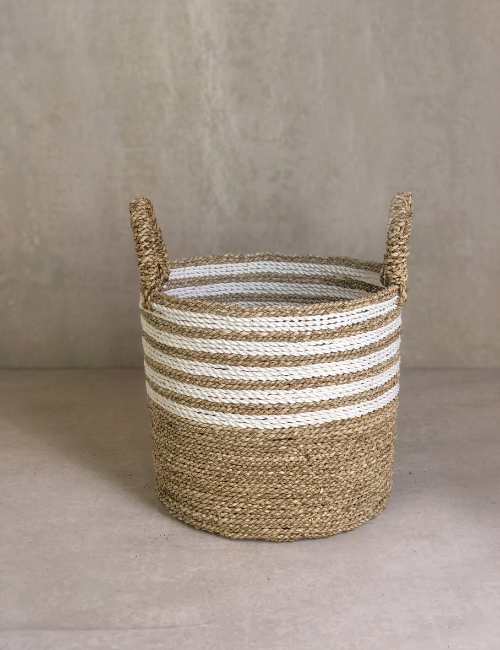
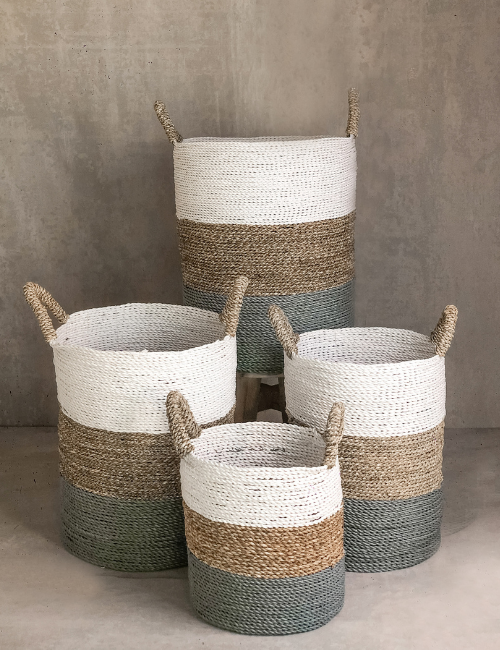 Big Sur Basket. Spruce up your home décor game with this ultra-functional basket from planters to storage the Big Sur Basket can be versatile as you need them to be.
Big Sur Basket. Spruce up your home décor game with this ultra-functional basket from planters to storage the Big Sur Basket can be versatile as you need them to be. -
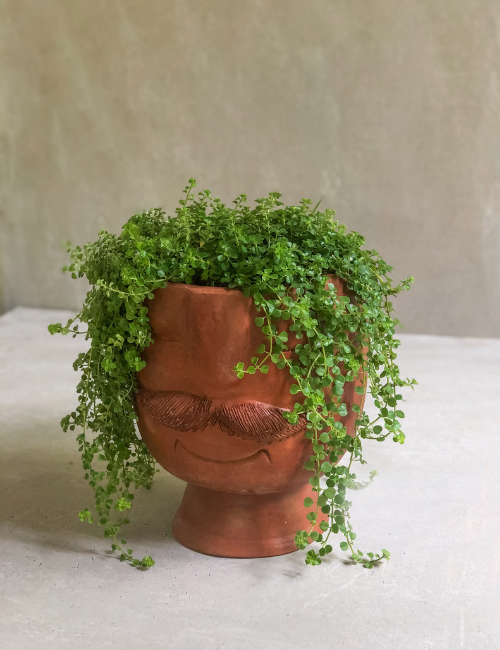 Pilea Depressa in Pedro Terracotta. Pilea Depressa is an evergreen ornamental climber native to Brazil and Mexico. The tiny green leaves with scalloped edges are less than ¼ of an inch and grow on delicate pinkish stems. Numerous tiny, white, petal-less flowers grow in the spring to make it nothing less than a fairy vine. Price include Pedro Terracotta. The plant usually requires bright shade. In outdoors, select a well-lit shady area. Importantly, keep it away from direct sun, especially the peak hours. 2-3 times a week, make sure the top or 2-3 cm of the soil should be kept moist
Pilea Depressa in Pedro Terracotta. Pilea Depressa is an evergreen ornamental climber native to Brazil and Mexico. The tiny green leaves with scalloped edges are less than ¼ of an inch and grow on delicate pinkish stems. Numerous tiny, white, petal-less flowers grow in the spring to make it nothing less than a fairy vine. Price include Pedro Terracotta. The plant usually requires bright shade. In outdoors, select a well-lit shady area. Importantly, keep it away from direct sun, especially the peak hours. 2-3 times a week, make sure the top or 2-3 cm of the soil should be kept moist -
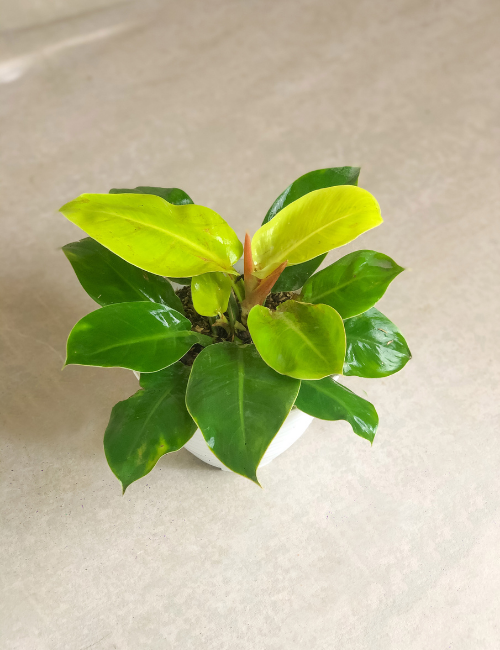 Philodendron Moonlight. This evergreen, clumping cultivar goes by the common name lime Philodendron. Why? Its leaves, and new growth sport a bright yellow-green chartreuse color. This color barely fades over time. Bright partial shade or indirect light will ensure a happy moonlight Philodendron. 2 to 3 times a week. If the soil is nearly dry, water it don't let the soil dry out entirely.
Philodendron Moonlight. This evergreen, clumping cultivar goes by the common name lime Philodendron. Why? Its leaves, and new growth sport a bright yellow-green chartreuse color. This color barely fades over time. Bright partial shade or indirect light will ensure a happy moonlight Philodendron. 2 to 3 times a week. If the soil is nearly dry, water it don't let the soil dry out entirely. -
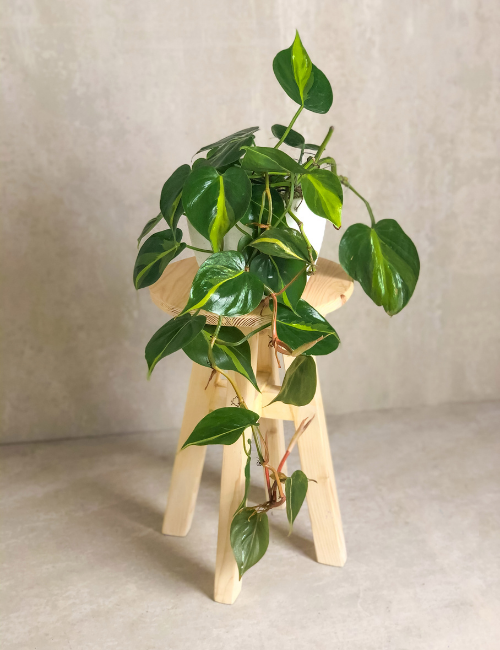 Philodendron Hederaceum 'Brasil'. Philodendron hederaceum 'Brasil' is a wild and bold cultivar of the classic Heartleaf Philodendron. Its variegated leaves look almost painted, with strokes of yellow and lime green across the deep green foliage. Low to bright, indirect light. 2-3 times a week. Water sparingly, making the potting mixture barely moist and allowing the top third to dry out before watering again.
Philodendron Hederaceum 'Brasil'. Philodendron hederaceum 'Brasil' is a wild and bold cultivar of the classic Heartleaf Philodendron. Its variegated leaves look almost painted, with strokes of yellow and lime green across the deep green foliage. Low to bright, indirect light. 2-3 times a week. Water sparingly, making the potting mixture barely moist and allowing the top third to dry out before watering again. -
 Peperomia Watermelon in Alani Terracota. Watermelon peperomia (Peperomia argyreia) is appreciated for its rounded, fleshy leaves marked with silver and dark green stripes that resemble the markings of a watermelon. Watermelon peperomia is a low-growing plant that reaches only 6 to 8 inches tall at maturity. Prce include Alani Terracotta pot, exclude wood stand. Watermelon peperomia thrives in bright, indirect sunlight. Water thoroughly when the top 2 – 3 cm of soil is dry to the touch. Allow the soil to dry out a bit between watering. Always keep an eye on your plant–if the leaves droop or feel a bit thin, it may also be time to water.
Peperomia Watermelon in Alani Terracota. Watermelon peperomia (Peperomia argyreia) is appreciated for its rounded, fleshy leaves marked with silver and dark green stripes that resemble the markings of a watermelon. Watermelon peperomia is a low-growing plant that reaches only 6 to 8 inches tall at maturity. Prce include Alani Terracotta pot, exclude wood stand. Watermelon peperomia thrives in bright, indirect sunlight. Water thoroughly when the top 2 – 3 cm of soil is dry to the touch. Allow the soil to dry out a bit between watering. Always keep an eye on your plant–if the leaves droop or feel a bit thin, it may also be time to water. -
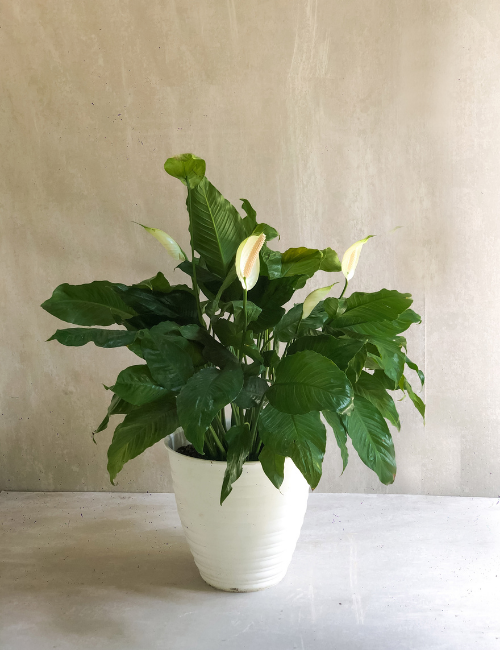 Peace Lily. Peace lilies are tropical, evergreen plants that thrive on the forest floor, where they receive dappled sunlight and consistent moisture. This tropical shade-loving plant helps cleanse the air we breathe. While we all appreciate cleaner, oxygenated air, it’s also the easy peace lily care, resiliency and forgiving nature that makes them such popular houseplants. This Peace Lily is Extra Large size with height between 80 – 100cm and pot diameter 45cm. Keep these plants out of direct afternoon sunlight, but in a bright, well-lit area. An east-facing window is ideal, as they will be exposed to the bright morning sun but avoid the intensity of mid-day rays. Peace lilies are far more tolerant of underwatering than overwatering, which is one of the most common reasons for a peace lily to die. Because of this, you should never water peace lily plants on a schedule. Rather, you should check them once a week to see if they need to be watered. Simply touch the top of the soil to see if it is dry. If it is, water your peace lily.
Peace Lily. Peace lilies are tropical, evergreen plants that thrive on the forest floor, where they receive dappled sunlight and consistent moisture. This tropical shade-loving plant helps cleanse the air we breathe. While we all appreciate cleaner, oxygenated air, it’s also the easy peace lily care, resiliency and forgiving nature that makes them such popular houseplants. This Peace Lily is Extra Large size with height between 80 – 100cm and pot diameter 45cm. Keep these plants out of direct afternoon sunlight, but in a bright, well-lit area. An east-facing window is ideal, as they will be exposed to the bright morning sun but avoid the intensity of mid-day rays. Peace lilies are far more tolerant of underwatering than overwatering, which is one of the most common reasons for a peace lily to die. Because of this, you should never water peace lily plants on a schedule. Rather, you should check them once a week to see if they need to be watered. Simply touch the top of the soil to see if it is dry. If it is, water your peace lily. -
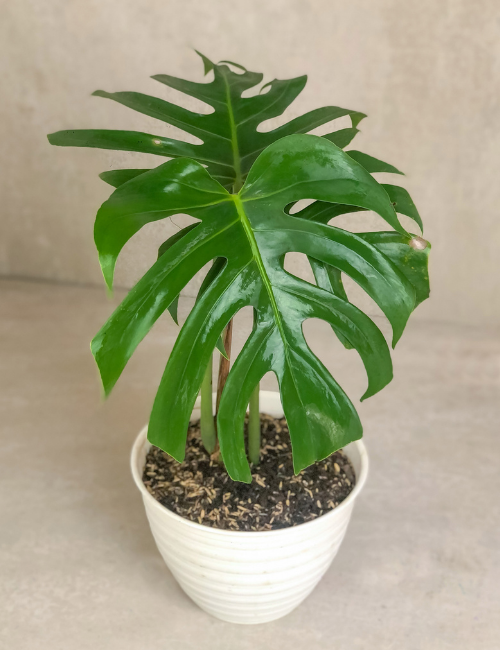 Monstera Borsigiana. Monstera Borsigiana, otherwise known as the Swiss cheese plant, grows wildly in the jungles of southern Mexico and Panama. These leafy guys look great in any home and make a statement in almost any corner of a room. The right amount of sunlight is essential for a monstera’s leaf development. Place it in a spot where it can receive filtered, indirect sunlight. 2-3 times a week. Water sparingly, making the potting mixture barely moist and allowing the top third to dry out before watering again.
Monstera Borsigiana. Monstera Borsigiana, otherwise known as the Swiss cheese plant, grows wildly in the jungles of southern Mexico and Panama. These leafy guys look great in any home and make a statement in almost any corner of a room. The right amount of sunlight is essential for a monstera’s leaf development. Place it in a spot where it can receive filtered, indirect sunlight. 2-3 times a week. Water sparingly, making the potting mixture barely moist and allowing the top third to dry out before watering again. -
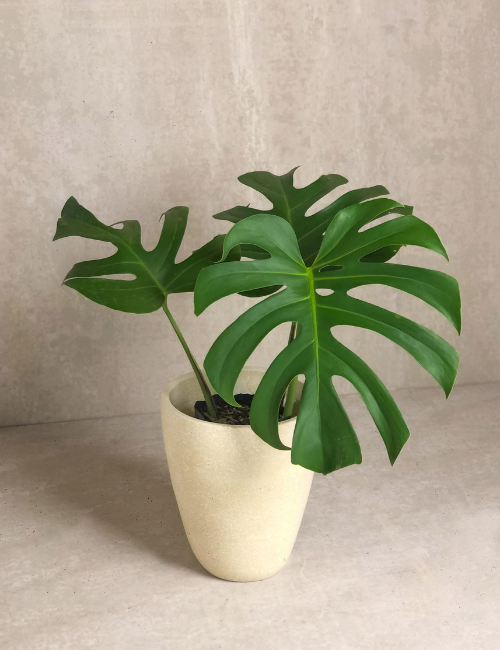 Monstera Borsigiana in Alani Terracotta. Monstera Borsigiana, otherwise known as the Swiss cheese plant, grows wildly in the jungles of southern Mexico and Panama. These leafy guys look great in any home and make a statement in almost any corner of a room. The right amount of sunlight is essential for a monstera’s leaf development. Place it in a spot where it can receive filtered, indirect sunlight. 2-3 times a week. Water sparingly, making the potting mixture barely moist and allowing the top third to dry out before watering again.
Monstera Borsigiana in Alani Terracotta. Monstera Borsigiana, otherwise known as the Swiss cheese plant, grows wildly in the jungles of southern Mexico and Panama. These leafy guys look great in any home and make a statement in almost any corner of a room. The right amount of sunlight is essential for a monstera’s leaf development. Place it in a spot where it can receive filtered, indirect sunlight. 2-3 times a week. Water sparingly, making the potting mixture barely moist and allowing the top third to dry out before watering again. -
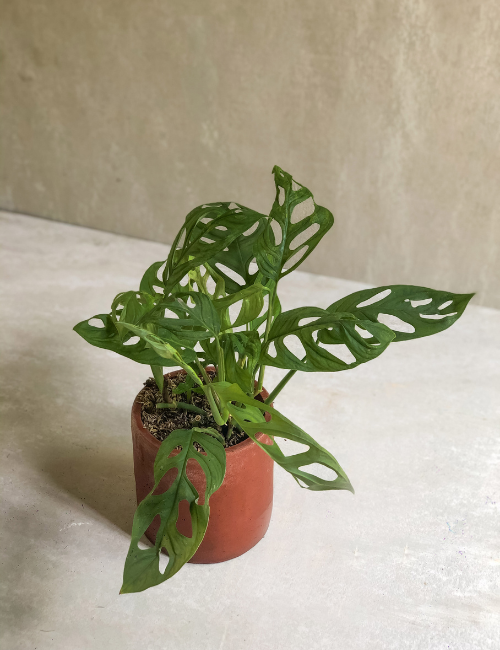 Monstera Adansonii in Terracotta. The Swiss cheese plant, Monstera Adansonii, gets its name from its large, heart-shaped leaves, and as the plant ages, the leaves develop holes (called fenestration) that makes the leaves resemble Swiss cheese. Swiss cheese plant is a tropical perennial plant native to Central and South American that is typically grown as a houseplant. Swiss cheese plant is very easy to grow. The plants grow best in indirect sunlight. If direct sunlight is unavoidable, limit the exposure to just two to three hours of morning sun. 2-3 times a week. If the soil is nearly dry, water it don't let the soil dry out entirely.
Monstera Adansonii in Terracotta. The Swiss cheese plant, Monstera Adansonii, gets its name from its large, heart-shaped leaves, and as the plant ages, the leaves develop holes (called fenestration) that makes the leaves resemble Swiss cheese. Swiss cheese plant is a tropical perennial plant native to Central and South American that is typically grown as a houseplant. Swiss cheese plant is very easy to grow. The plants grow best in indirect sunlight. If direct sunlight is unavoidable, limit the exposure to just two to three hours of morning sun. 2-3 times a week. If the soil is nearly dry, water it don't let the soil dry out entirely. -
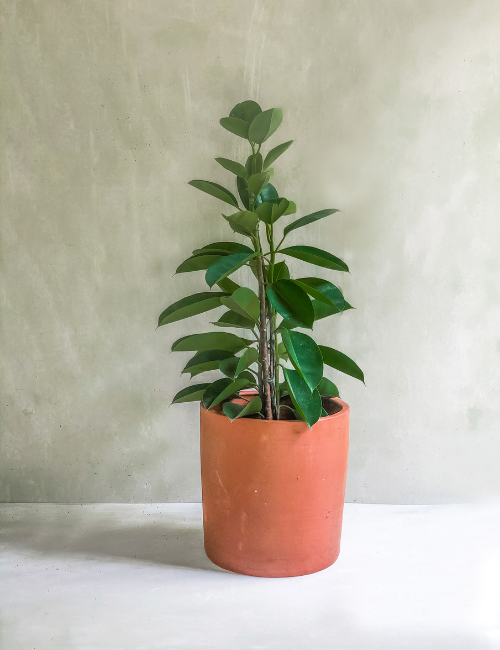 Ficus Elastica in Terracotta. If you’re looking for a houseplant that makes a bold statement, then look no further than a Rubber Plant (Ficus elastica), also called Indian Rubber Tree. With their ease of care, these are perfect indoor plants for beginners or those who consider themselves having a black thumb. Price include Terracotta Pot. A nice brightly lit spot is ideal, without direct sunlight. Water once the soil becomes slightly dry to the touch and make sure the pot has sufficient drainage holes to allow excess water to seep through. The worst thing you can do regarding watering is "give it too much".
Ficus Elastica in Terracotta. If you’re looking for a houseplant that makes a bold statement, then look no further than a Rubber Plant (Ficus elastica), also called Indian Rubber Tree. With their ease of care, these are perfect indoor plants for beginners or those who consider themselves having a black thumb. Price include Terracotta Pot. A nice brightly lit spot is ideal, without direct sunlight. Water once the soil becomes slightly dry to the touch and make sure the pot has sufficient drainage holes to allow excess water to seep through. The worst thing you can do regarding watering is "give it too much". -
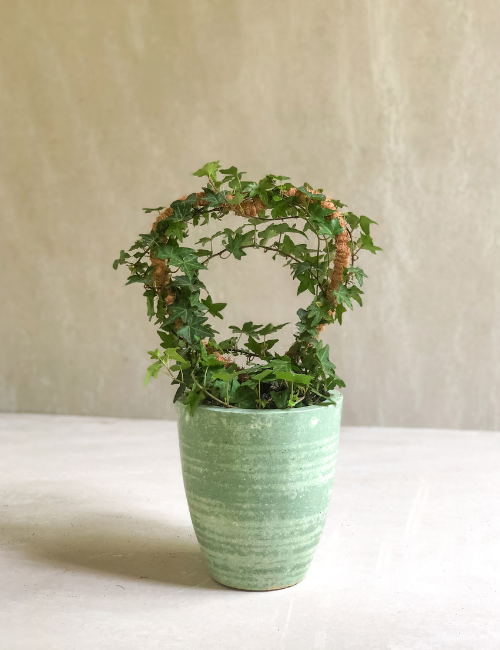 English Ivy in Emerald Terrazzo Pot. English ivy is also a very popular indoor houseplant or for use in outdoor hanging baskets. Ivy can make a wonderful, bright light houseplant. It can grow long and lush and bring a bit of the outdoors inside. Price include Emerald Terrazzo Pot. Filtered sun or partial shade 2 -3 times a week. Potted ivy prefers moist, humid conditions, but not soaking. Don’t let the soil dry out and keep it evenly moist
English Ivy in Emerald Terrazzo Pot. English ivy is also a very popular indoor houseplant or for use in outdoor hanging baskets. Ivy can make a wonderful, bright light houseplant. It can grow long and lush and bring a bit of the outdoors inside. Price include Emerald Terrazzo Pot. Filtered sun or partial shade 2 -3 times a week. Potted ivy prefers moist, humid conditions, but not soaking. Don’t let the soil dry out and keep it evenly moist -
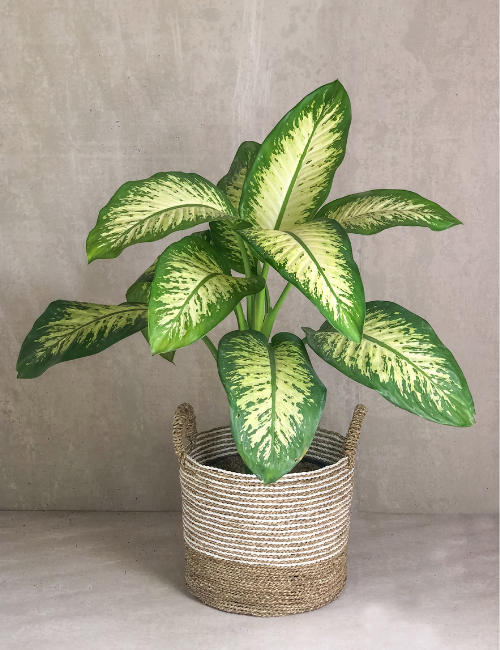 Dieffenbachia Seguine 'Tropic Snow'. Everything about the dumb cane, or dieffenbachia, is dramatic. Native to the tropics of Central and South America, it has huge variegated leaves. Even the way it grows is showy, new leaves curling up from the central stem before they unfurl. Price exclude basket. Diffenbachia likes a good amount of light throughout the day, but ideally not direct sunlight. 2-3 times a week. Water sparingly, making the potting mixture barely moist and allowing the top third to dry out before watering again.
Dieffenbachia Seguine 'Tropic Snow'. Everything about the dumb cane, or dieffenbachia, is dramatic. Native to the tropics of Central and South America, it has huge variegated leaves. Even the way it grows is showy, new leaves curling up from the central stem before they unfurl. Price exclude basket. Diffenbachia likes a good amount of light throughout the day, but ideally not direct sunlight. 2-3 times a week. Water sparingly, making the potting mixture barely moist and allowing the top third to dry out before watering again. -
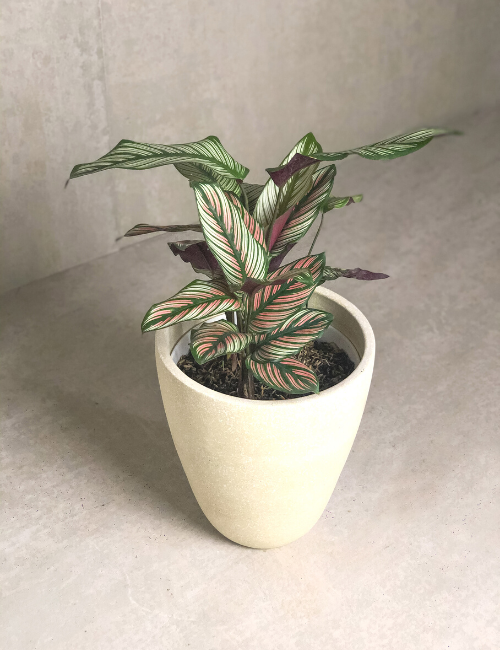 Calathea Majestica ‘White Star’ in Alani Terracotta. Calathea Majestica ‘White Star’ is a cultivar of the Ornata Species and one of the most elegant. With paint like white and pink stripes on the leaves, this calathea is a staple plant for the passionate collector. Bright, indirect light 2 to 3 times a week. If the soil is nearly dry, water it don't let the soil dry out entirely
Calathea Majestica ‘White Star’ in Alani Terracotta. Calathea Majestica ‘White Star’ is a cultivar of the Ornata Species and one of the most elegant. With paint like white and pink stripes on the leaves, this calathea is a staple plant for the passionate collector. Bright, indirect light 2 to 3 times a week. If the soil is nearly dry, water it don't let the soil dry out entirely -
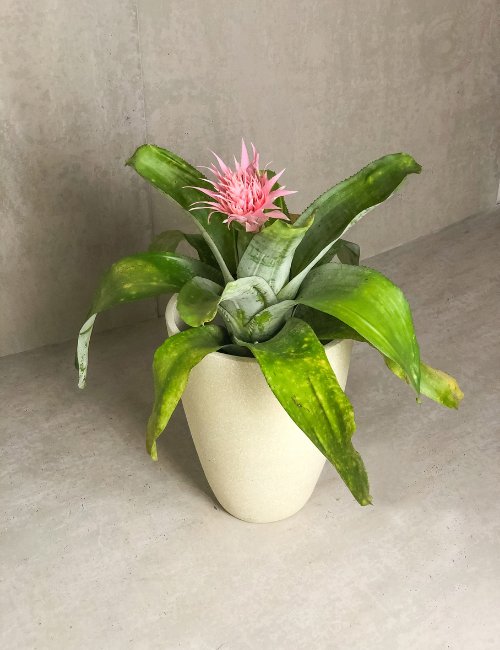 Bromeliad Aechmea in Alani Terakota. Bromeliad Aechmea is a tropical epiphyte, meaning that they naturally grow in trees for support. They are not parasitic, and have roots that cling to branches. The flowers are actually bracts that can remain colourful for up to 2 or more months. Aechmeas like bright light, like near an east or west window. They need this exposure to bring out the variegation in their foliage & also to flower. 2-3 times a week. If the soil is nearly dry, water it don't let the soil dry out entirely.
Bromeliad Aechmea in Alani Terakota. Bromeliad Aechmea is a tropical epiphyte, meaning that they naturally grow in trees for support. They are not parasitic, and have roots that cling to branches. The flowers are actually bracts that can remain colourful for up to 2 or more months. Aechmeas like bright light, like near an east or west window. They need this exposure to bring out the variegation in their foliage & also to flower. 2-3 times a week. If the soil is nearly dry, water it don't let the soil dry out entirely. -
 Begonia Malculata. Begonia maculata, or Polka Dot begonia as it’s often called, is a splashy show-stopper that looks fantastic with it’s olive green leaves and contrasting spots. It’s a houseplant that is likely to turn heads in your home, and thankfully it isn’t too difficult to care for. Bright, indirect light. Higher light levels will promote strong growth and blooms, but avoid direct sunlight Keep the soil generally moist, letting the top half inch of soil dry out between watering. Will not tolerate soggy soil.
Begonia Malculata. Begonia maculata, or Polka Dot begonia as it’s often called, is a splashy show-stopper that looks fantastic with it’s olive green leaves and contrasting spots. It’s a houseplant that is likely to turn heads in your home, and thankfully it isn’t too difficult to care for. Bright, indirect light. Higher light levels will promote strong growth and blooms, but avoid direct sunlight Keep the soil generally moist, letting the top half inch of soil dry out between watering. Will not tolerate soggy soil. -
 Asplenium Lasagna in White Terrazzo. Known as Kadaka Lasagna in Indonesia this plant is a favourite because its very wiggle-edged lush fern for tropical gardens and indoor decor - plant it somewhere shady and moist and watch it unfurl. No direct sunlight Only after Soil dries completely
Asplenium Lasagna in White Terrazzo. Known as Kadaka Lasagna in Indonesia this plant is a favourite because its very wiggle-edged lush fern for tropical gardens and indoor decor - plant it somewhere shady and moist and watch it unfurl. No direct sunlight Only after Soil dries completely
